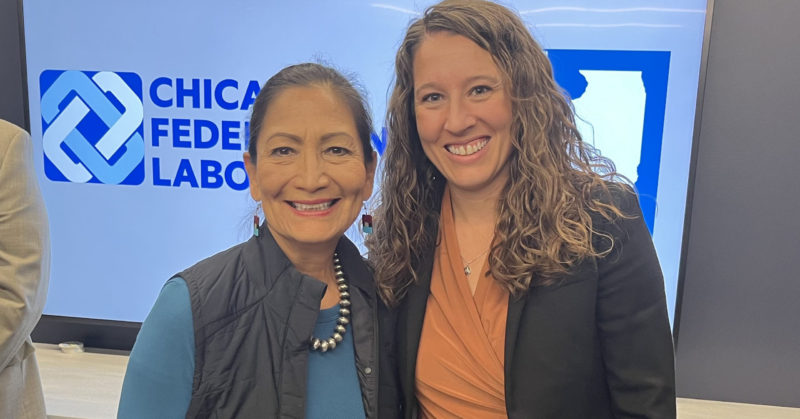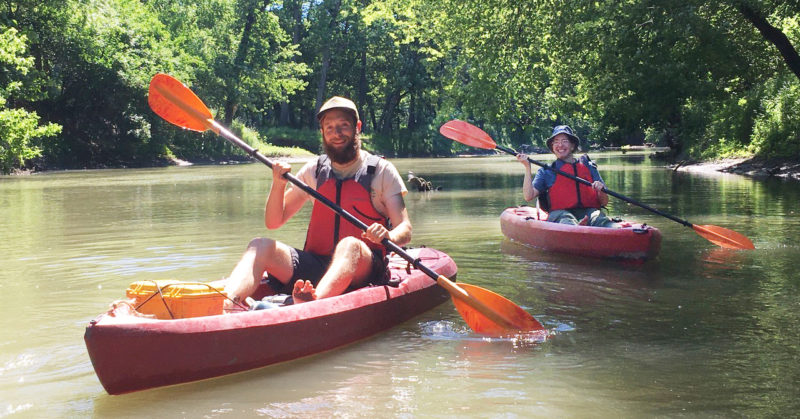Each winter, we cannot wait to show you just how important you are to everything we do. From our fight against pesticides to the struggle of keeping pollution from entering our rivers, every bit of the work we do would be less successful if not for your support, actions, and inspiration. We are happy to share what we accomplished together in 2022!
Passing CEJA was Just the Beginning
PRN has been working tirelessly to ensure that the Climate and Equitable Jobs Act (CEJA) lives up to its name. CEJA, one of the nation’s most comprehensive and equitable energy and climate laws, will help Illinois meet our renewable energy goal of 40% by 2030 and reduce health-harming and planet-warming pollution from our energy and transportation sectors.
Illinois has begun implementing the many programs in CEJA, and PRN is working inside the Illinois Clean Jobs Coalition to lead the work, coordinating a dozen different working groups to achieve the high aims of CEJA. We are working with partners, advocates, state agencies, and community leaders to ensure that communities understand and will benefit from CEJA’s opportunities including solar, energy efficiency, electric vehicles, and more. We have given presentations, attended conferences, and met with coal community leaders to support real people and real communities in the transition to a clean energy future in Illinois.

at an abandoned mine lands event in Chicago.
Fighting for the Big Muddy
While the Bulldog Mine was stopped, coal mining continues to be a threat to clean water in many parts of the state. In southern Illinois, PRN is working to stop pollution from the Sugar Camp and Pond Creek mines, both of which discharge into the Big Muddy River.
PRN and Sierra Club filed a “Motion to Intervene” in the Attorney General’s lawsuit against Sugar Camp Energy, LLC related to contamination from PFAS chemicals used when the mine attempted to put out an underground fire with foam that contained the chemicals. Through intervention, we seek to become a plaintiff in the case and assert our specific interests in protecting the ecosystem and recreational resources of nearby water bodies, including the Big Muddy River.
PRN and Sierra Club are also taking action to reverse the approval of a pipeline that would discharge highly saline water from the Pond Creek mine into the Big Muddy. The 12-mile long pipeline was approved in the mine’s NPDES water discharge permit issued this April. Pipelines like these are known to rupture, and indeed a similar pipeline at Sugar Camp ruptured this July, spilling over 20,000 gallons of mine wastewater near Macedonia, Illinois.
“The public has a right to healthy, undamaged water systems. Sugar Camp mine has failed to ensure toxic pollutants like PFAS are not discharged into Akin Creek and Middle Fork Big Muddy River and must be held accountable for the harm they have caused to both the local community and to downstream watersheds,” says PRN Senior Water Resources Engineer Andrew Rehn.
Opportunities for Revitalizing Communities
In the fall of 2021 shortly after the passage of CEJA, Congress passed the Infrastructure Investment and Jobs Act (IIJA), also known as the bipartisan Infrastructure Act. The law boosted important programs to clean up legacy pollution and meet climate and clean energy goals. The IIJA included a “win” that PRN had been advocating for — it reauthorized the expired funding mechanism for the Abandoned Mine Land (AML) Reclamation Program trust fund. It will also inject an additional $11.3 billion into the program over the next 15 years. This effort will put people to work restoring polluted lands and waters, and it will help build a new economic foundation in Illinois’ coal communities.
The IIJA was worth celebrating but it is dwarfed by what Congress did this summer when they passed the Inflation Reduction Act. The Act includes $369 billion for “Energy Security and Climate Change,” the single largest climate investment in American history. Together, these programs will reduce U.S. carbon pollution 40 percent below 2005 levels by 2030, getting us four-fifths of the way to President Biden’s aggressive climate goal.
PRN is working to ensure these federal opportunities reach underserved communities, including rural and coal communities. This year we supported the work of the Interagency Working Group (IWG) on Coal and Power Plant Communities, a federal group tasked with bringing federal assistance and programs to transitioning coal communities. This summer we worked with the IWG to organize and facilitate four listening sessions with six different coal and power plant communities. The sessions culminated in a “Revitalizing Energy Communities in the Illinois Basin” event in Carbondale. The event provided invaluable networking opportunities and information on how energy communities can benefit from federal funding and resources to support economic revitalization. PRN will continue to support the work of the IWG in Illinois into the future.
Getting Our Hands Dirty
Together with our partners in the IDEA Farm Network, we hosted five events during the summer of 2022 to assist Illinois farmers with improving the environmental health and profitability of their farms. Topics ranged from regenerating farmland to incorporating no-till and cover cropping systems that build soil health and support pollinator populations. We look forward to our winter programs and more exciting learning opportunities for 2023.
Using data collected from our Tree and Plant Health Monitoring Program, we released the report “Herbicide Drift and Chemical Trespass on Natural Landscapes and Habitats” for the Illinois Nature Preserves Commission. The report provides an overview of the issue of herbicide drift and current monitoring efforts. It also provides the Commission with recommendations on how they can best protect Nature Preserves from herbicide drift.
Thanks to our amazing volunteers, we expanded our Tree and Plant Health Monitoring Program, which now covers approximately 7,800 square miles of the state. We held multiple webinars on the issue of herbicide drift and created three videos on the impacts of drift to ecosystem health. We are also building a strong and diverse coalition of landowners, land managers, scientists, and advocates that can work together to protect our communities, our growers, and our wildlife, and who can help raise the alarm about the threat of herbicide injury to climate health.

with paddling on the Salt Fork River.
Bringing What We Do To You
This year saw the successful launch of the PRN Lunch Series where program staff took you through the ins and outs of some of the issues they are working on to protect water, heal land, and inspire change across Illinois. From Andrew Rehn’s discussion on coal ash to Kim Erndt-Pitcher’s discussion on herbicide drift, we gave seven presentations to over 470 attendees. What we appreciated most about the events was seeing familiar faces during these Zoom presentations. Thanks to everyone who attended and who submitted questions!
And… We Stopped Bulldog Mine!
This past Spring, Sunrise Coal’s permit for the Bulldog mine in Vermilion County expired due to lack of use. This inaction effectively killed the proposed mine and the fight against Bulldog Mine was won. This is a grassroots victory that took years!!
Thank you Stand Up To Coal and PRN members for protecting the Salt Fork River. Fighting this mine took over a decade of work and required years of active community involvement. Victory takes time and commitment, and PRN will continue to fight against dirty fossil fuels.
These accomplishments this year would not have been possible without you, our members. Your support makes all the difference. With you, we are a strong voice in protecting our water.







